Scotland roadshow highlights successes and challenges in the Devolved Nations
Our second and final roadshow focusing on the Supporting Armed Forces in Acute Hospital Settings programme took place last week in Glasgow; and shone a light on work in the Devolved Nations.
We were thrilled to be joined by the grant holders, Armed Forces Advocates funded through the programme, and other stakeholders too.
This useful get-together allowed us to learn so much about the progress that’s been made from these pilot projects. The difference it has made to the lives of so many in this community and also, in many cases, the next steps to sustaining the fantastic work that has taken place.
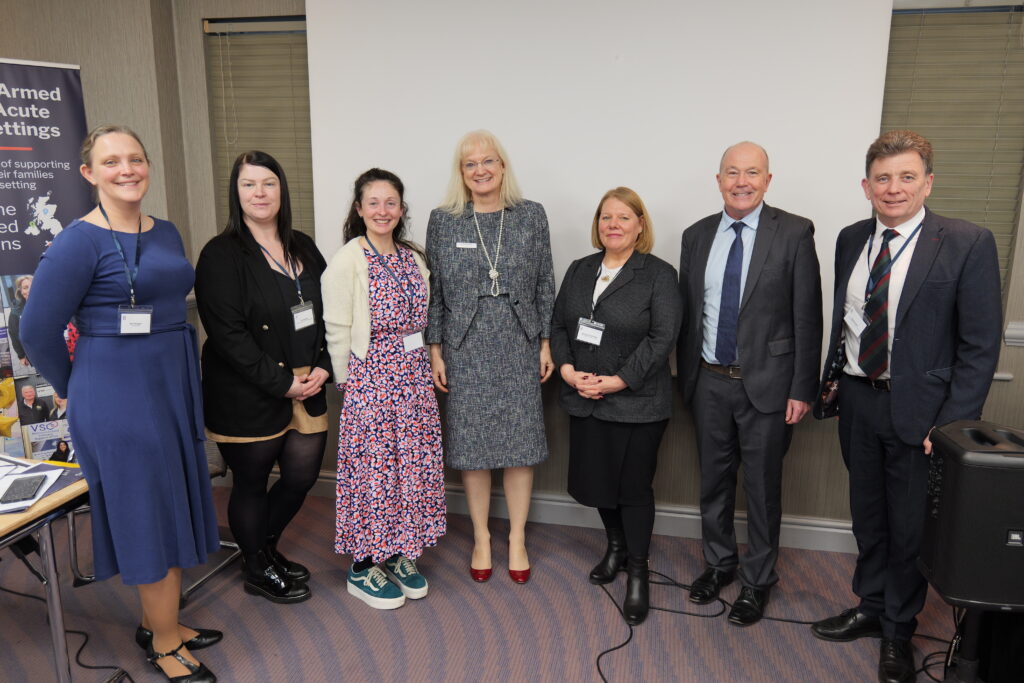
The acute hospitals programme
The Supporting Armed Forces in Acute Hospital Settings programme was jointly funded by the Covenant Fund and NHS England and NHS Improvement to support pilot projects to try better ways of supporting Veterans and their families when they are in a hospital setting.
Almost £2 million was awarded to 17 projects across the UK.
In most cases, this has involved having an Armed Forces Advocate to provide additional support and co-ordination with services and Armed Forces charities; and making other improvements that benefit the Armed Forces community.
In Northern Ireland, the Somme Nursing home received funding to establish the Veterans’ Advice Line for Statutory Professionals (VASP) – a signposting service for organisations, which has also attracted a sizeable number of calls from Veterans in need themselves.
What we know so far
We were pleased to be joined by our evaluators for the programme, the University of Chester – who continue to undertake a live evaluation as the funded work progresses.
Their data collection to 9 October 2023 has shown:
- there are now over 2,000 entries onto the Armed Forces Advocates portal, which records data about the service users they work with.
- they have received over 1,800 feedback surveys from staff, family members and service users.
- of the service users supported by the Armed Forces Advocates, 96.6% are male and their average age is 75 years. 45.2% had served National Service.
- 31.6% of service users said they had experienced a traumatic event during their time in the Armed Forces.
- majority of service users were in hospital due to illness with 4% saying their illness was Service attributable.
The final evaluation report is due later this year.
Differences and commonalities across the projects
It was great to hear from the grant holders about the progress, challenges, successes and developments they’ve each experienced. While services may differ across the nations, it was also clear that there was much cross-over and some common themes emerged.
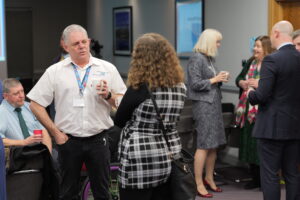
Identification…
Many of the grant holders touched on the importance of identification of the Veterans. From ensuring the right questions are asked at admission to hospital, to novel ways of identifying Veterans at a glance. Proper identification has proven invaluable in the success of the services provided.
It hasn’t always been a simple task. As we heard from several of the grant holders, difficulties with training staff, high staff turnover at the NHS and standardising processes for identification, have all presented challenges.
In Wales they’ve used the poppy system – affixing a red poppy to the records or bed of a Veteran or those with an Armed Forces link.
Maisy Provan, Armed Forces Covenant & Veterans Healthcare Collaborative Lead explained that one of the biggest challenges they’ve had in Wales is Veteran identification within their IT systems. She said: “If you can’t tell who they are, you can’t put anything in place.”
Ensuring people are being asked at admission and that their Armed Forces status is being recorded at that early stage has been vital.
Similarly, Margaret Partridge, Veteran Support Co-ordinator at NHS Greater Glasgow and Clyde, spoke about the importance of being able to use a data management system that means staff can search for patients with an Armed Forces link much more efficiently. She shared an insight into the difficulties they experienced in having to keep reintroducing themselves to patients and different staff on shift.
Equally, when patients are referred between services, being able to pass on their information, for example to GPs, has been a huge help.
Collaboration…
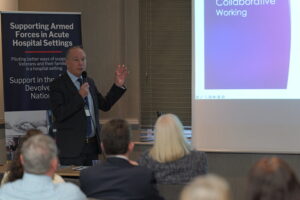
Collaboration has been a key aspect in the success of much of the work that’s taken place. Robert Reid, Defence Medical Welfare Service, explained: “We are a good organisation, but no organisation can do it itself. We all know that, and that level of collaboration and help in Scotland is really excellent and that has undoubtedly helped this project get to where we are.”
This collaboration extends beyond other NHS departments and even other Service charities. Sharing his experience of supporting Veterans in Northern Ireland through VASP, Mark Ewing said: “I visit the prisons and have a chat to the sentence managers. And that’s good because it means when folk are coming out of incarceration, they can get in touch with my service.”
In Wales, there has been a focus on working closer with military units, including Reserve units, to improve understanding of what it means to be or have been in the Armed Forces.
Zoe Roberts, Armed Forces Covenant & Veterans Healthcare Collaborative Lead for Betsi Cadwaladr University Health Board, described how they work closely with the universities in Wales, aiming to provide a good insight into the Armed Forces portfolio at the setting to incoming undergraduate nurses at the acute hospitals, so they are prepared for what they may see.
Equally, partnerships with Forces charities have boosted the work under the programme.
Zoe added: “We partnered with SSAFA, and they’ve been a God send to us from the outset.” This partnership has meant that rather than expecting clinicians to make several referrals to different Armed Forces charities, they now routinely refer to SSAFA who will take on the Veteran themselves and refer on as needed. They have had no negative feedback from patients who’ve been through this streamlined process.
Training…
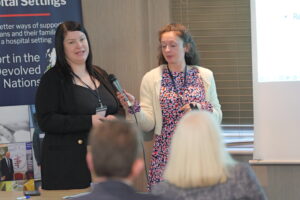
Establishing a good understanding of why this programme is needed has been achieved through various training opportunities across the Devolved Nations.
Many of the grant holders explained how they have struggled to make any training mandatory.
In Cardiff, Maisy Provan said: “We’ve had quite a focus on training our staff around Armed Forces awareness and who fits into the category; what does the Covenant mean; and what’s available and accessible.
We’ve also done lots around creating resources for our staff in terms of SharePoint links people can click on, things on the internet and bits on our website, externally-facing for patients.”
Maisy set up a staff network in Cardiff, similar to one which was already established in the north, where she runs Armed Forces coffee mornings. She adds: “Quite often, people don’t even realise their colleagues are Veterans or are married to someone who is serving, so it’s been a really nice way to get people together and get some of the messaging out there about what we’re trying to do as part of this wider piece, in the health board.”
Kari McGee, Project Manager at NHS Highlands, spoke about how it’s not just the staff who need to know what is going on, but also its about supporting the Armed Forces and Veterans community to better understand what they should be asking for and what they may be entitled to.
She said: “We decided to target trainee GPs and we worked with NHS Education for Scotland to develop a training package. Over the course of three hours, we would talk to the trainee GPs about what the Armed Forces and Veterans community look like; what the barriers and challenges they face when accessing health care might be; how we could reduce or remove or mitigate, or in any way make their passage into healthcare services, better; and a basic understanding of the Armed Forces Covenant.”
Off the back of that training she ended up linking with the Scottish Government to create a primary care training package. The package covers everything from the Covenant to the barriers and challenges that people might face, all the way through to some fictional case studies.
Sustainability…
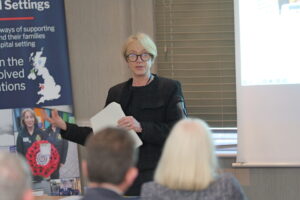
The successes achieved in sustaining these pilot projects in some form has been a positive outcome. There are next steps secured in almost all of the projects with some still to be confirmed. Some projects which started later than others will continue until at least 2025.
In Scotland, Greater Glasgow & Clyde is funding this work going forward, to create a sustainable Veterans’ Support Service. Similarly at NHS Lothian, they’ve received funding from the Scottish Government, from the National Framework.
Robert Reid explained: “We’ll be going from two Welfare Officers to four Welfare Officers with this funding.”
Julie Murray, Chief Officer of East Renfrewshire Health and Social Care Partnership, added: “The fact we had the funding from the Covenant Trust really helped us demonstrate impact and raised awareness…because of the evidence we built up as part of the work that we’ve done, we made a successful bid to the health boards charity.
We’re able to enhance the service so that we can recruit Welfare Officer roles…and will be able to expand beyond hospitals into community mental health primary care – make a real, whole system approach.”
Over in Wales, it’s good news too. They’ve recently been told their bid for a two-year Welfare Officer post has been successful and the Betsi Cadwaladr Health Board are due to make Zoe’s role permanent. This provides a great standpoint for support in the south of Wales too – though their work is at an earlier stage than in the north.
Success through innovation
Sonia Howe, Director of Policy & Communications at the Trust, summed up the progress the programme has made so far.
“We designed this program to fund innovative pilot projects in hospital settings. [We wanted] to see what could be done to improve the experiences of Veterans and their families – and these projects are just extraordinary. The change, and the legacy that is going to come from this work is just really wonderful to see.”
Anna Wright, Chief Executive of the Trust added: “To hear so many positive stories from the pilot projects is wonderful. And to know there will be a legacy, something tangible to show that this is what ‘good’ looks like is fantastic. Ultimately, it’s all about supporting the Armed Forces community, and what a tremendous job you have done and are doing.”
Find out more
A recording from the roadshow is available to view on our website, here.
You can also find lots of information about the Supporting Armed Forces in Acute Hospital Settings programme in England and across the Devolved Nations in our dedicated programme zone.
Finally, there are some useful programme resource available in our Knowledge Network, to further your learning about the programme, here.